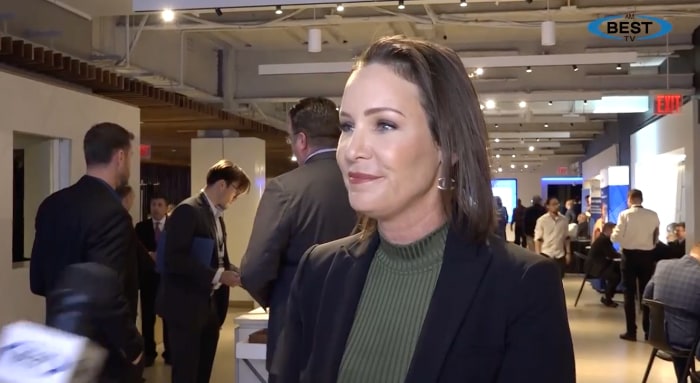Transparent risk pricing key to reducing ILS volatility: Vesttoo’s Henderson

Julia Henderson, Chief Commercial Officer at ILS focused insurtech Vesttoo, has asserted that leveraging technology to deliver more transparent and objective risk pricing is key to gaining both investor and rating agency confidence in the alternative capital space.
Speaking to AM Best TV at the recent Artemis ILS NYC 23 conference, Henderson said that investors remain attracted by the fundamental value proposition of ILS and the diversification it can offer for a portfolio.
But confidence has been shaken by volatility particularly in the catastrophe space, where modelling issues have led to problems with trapped capital and acted as a drag on returns.
Utilising emerging technologies including artificial intelligence and machine learning, Vesttoo has sought to provide ILS investors with better modelling insights and more clarity on risks they take on.
“What Vestoo does is bring that same sort of diversifying ability and the tech with it to the non-volatile space,” Henderson told AM Best TV at the Artemis conference.
“That’s where our value proposition is, in being able to provide that translation between insurance risk pricing to how investors make money. And we provide a great yield enhancement for these investors that doesn’t correlate to the rest of their portfolio. So they really appreciate that value.”
Indeed, transparency was a key theme of the day for Artemis ILS NYC 23, as experts agreed that a clearer view of risk is vital as the sector looks towards challenging new frontiers such as cyber.
On this point, Henderson concurred that new tech capabilities are “driving the innovation in our space” and noted that rating agencies, in addition to investors, are “finding a lot of comfort” in the open book policy promoted by Vesttoo and others.
“In insurance, what we have is a lot of data. Sometimes it’s good, sometimes it’s bad, and it’s tough to get comfortable with that data,” Henderson explained. “I think rating agencies like the fact that we’ve built over four years this proprietary technology to take a look at this data at an arm’s length with objective, transparent risk price.”
“Investors love that about us,” she added. So we’re able to take a lot of data for insurance and provide a good customised risk price structure for our cedants. And then we provide that risk to our investors in the capital markets in various forms through notes, through fund and through standalone trades.”
Despite advances in modelling, Henderson did also acknowledge that volatility in the ILS space also continues to be fuelled by unpredictable external factors in the macroeconomic environment, and specifically by the influence of inflation.
But she argued that inflation can be both a good and bad thing for the sector, as many products continue to be fairly ‘inflation-proof’ and insurance premiums have generally been shown to grow at a faster rate over time.
And looking ahead, Henderson remained confident that the investments into ILS will continue to remain attractive as a fundamentally uncorrelated class for investors, and with the expansion of the sector set to be fuelled by new tech and modelling capabilities.
“The good part about technologies like ours and other competitors in the broader ILS industry, is that the more transparent and objective we can be for our risk pricing to the broader capital markets in general, the pie will just widen,” she concluded.
“And the whole idea behind this is actually to bring premiums down and ultimately to bring more investors in … so there’s more trust in the system, less opacity.”
Watch the full video below:






